Are you burnt out and barely getting through the workday? Are you searching for a deeper meaning for your job role? Are you sick and tired of the lack of a work-life balance? Welcome to the new trend – quiet quitting.
When you are exhausted from all the deadlines, work stress and overwork, but are unable to or can’t afford to resign from your role, quiet quitting your job can be the solution you’re looking for. However, it can lead to dire consequences for both the employees and the organizations in the long run.
What is quiet quitting?
To put it simply, quiet quitting means deciding not to kill yourself for your job. It’s about not taking your work too seriously and defying the age old belief that work should completely reign over your personal life. Emerging from a latest viral TikTok video, this phenomenon is quickly becoming a trend across the globe among burnt out employees in understaffed organizations.
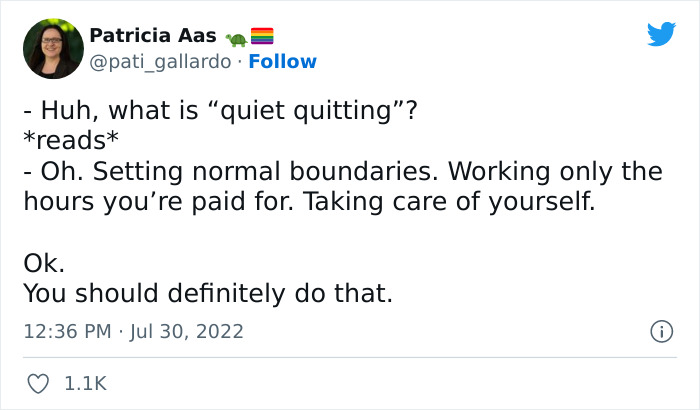
Unlike The Great Resignation trend that started in 2021, the quiet quitting trend is not about suddenly leaving your job or putting down your papers. It is about doing exactly what you’re paid for and doing precisely what your job role defines and requires you to do. It is not about slacking off at work nor about doing overwork. This philosophy and mindset is simply about rejecting the notion that all employees must go above and beyond their call of duty. It is about prioritizing a healthy work-life balance, your passions and hobbies, your personal relationships and your mental and emotional health.
Related: Why You Feel A Lack Of Meaning At Work: 8 Main Reasons
Quiet quitting is a way to counter job stress, work pressure and burnout. It is the answer to the hustle culture, where we are made to believe that we need to constantly work harder to be successful and happy. While this term may be a misnomer making employees appear like they don’t actually want to work and just want to get their salaries, in reality this trend is primarily about doing just what you are paid to do. It is about establishing healthy boundaries between work and life.
Signs of quiet quitting
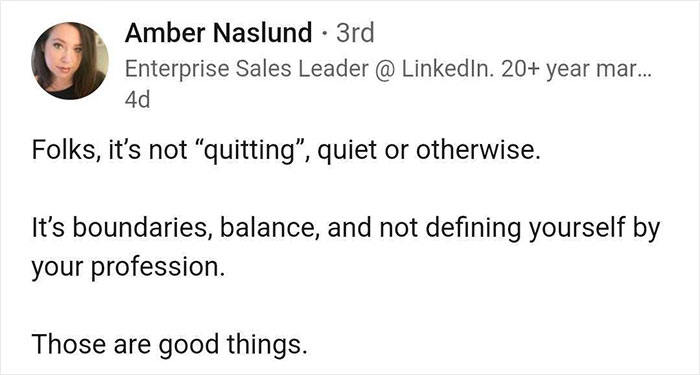
In a work environment, this trend can be very subtle to identify in employees by supervisors and managers. Here’s what quiet quitting work may look like –
- Lower interest in going above & beyond and feeling uninspired to achieve more
- Refusing to perform tasks out of job description
- Saying no to working long hours or staying late at work
- Always leaving the workplace on time
- Selecting or refusing projects based on preferences
- Being less involved in work or job role
- Taking up less responsibilities
- Reduced interaction with or isolation from other team members
- Avoiding leadership positions and roles
- Not answering work calls or messages after working hours
- Being emotionally detached and disengaged from work and responsibilities on a daily basis
- Doing the bare minimum work required or meeting the minimum performance standards
- Avoiding doing additional work for the benefit of the organization
- Withdrawal from task and activities that are not mandatory
- Not actively participating or contributing in team meetings
However, it should be understood that that quiet quitting is not necessarily a planned or organized action undertaken by a group of employees to protest against work policies. It is more of an individual decision and action to protect one’s mental health. But the phenomenon has become widely popular across social media and is being considered as a movement.
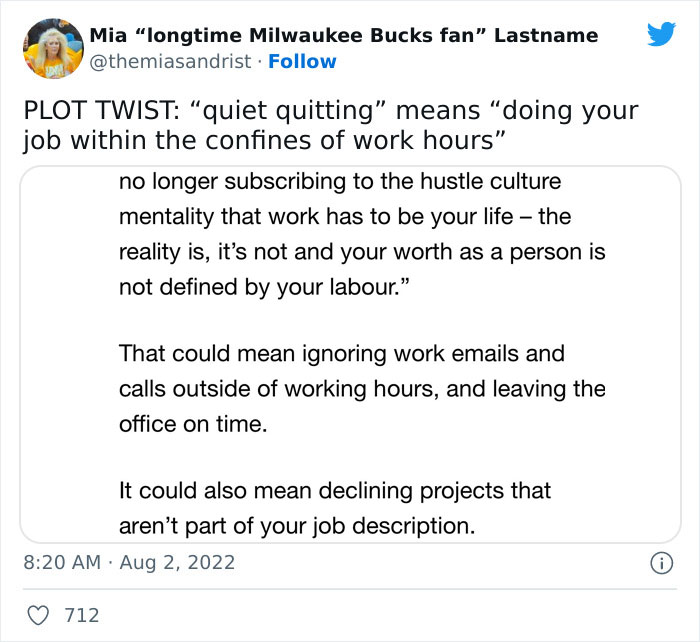
Why are employees quiet quitting?
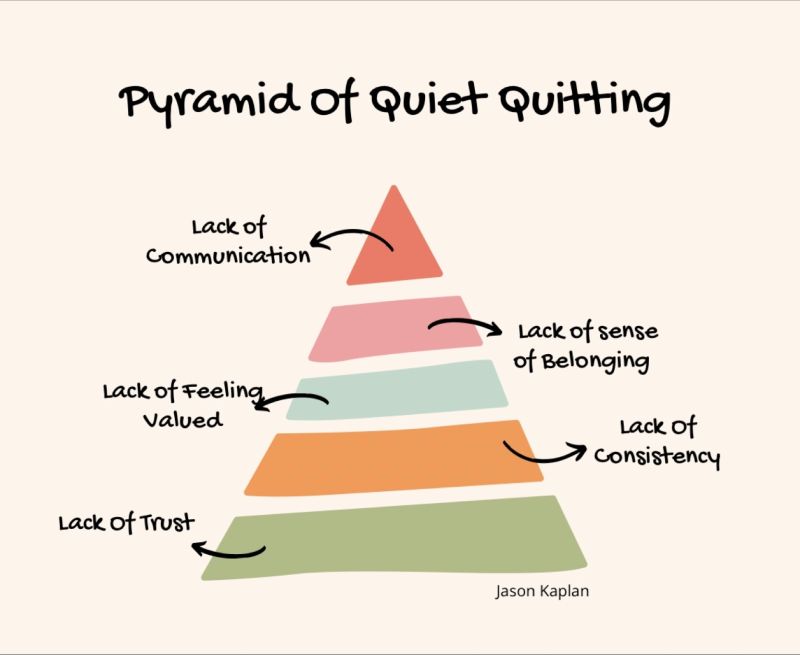
The question remains – why are people so thrilled about quiet quitting? Why would anyone opt to be “lazy” and “disloyal” instead of working harder to climb the proverbial ladder of success? But shouldn’t the real question be why are employees expected to do more than what they have been recruited to do?
It is perhaps this dichotomy of thoughts that has made this online movement so viral recently. But what indeed is the real cause behind the sudden popularity of this phenomenon?
- Overwork.
- Burnout.
- Work life imbalance.
One of the main reasons why quiet quitting has resonated with so many employees is the simple fact that this movement puts the focus back on the importance of the mental health of employees. It allows people to evaluate and rethink their priorities and focus on what is truly important to them.
Related: 8 Signs You Should Quit Your Job
Here are some of the most common reasons why so many people are engaging in quiet quitting –
1. Remote working during the pandemic
The global work culture has changed greatly over the last 2 years with most people around the world working remotely or having a hybrid work schedule due to the pandemic. It has made people realize that they can still work effectively without going through the daily cycle of abuse known as commuting to work. Remote work and hybrid work has built the foundation for the quiet quitting trend as employees can now see themselves thriving in alternate systems of work.
With remote work, came several employee benefits like flexible work hours, digital meetings, lack of daily commute and the option to slack off without getting noticed. Now that most organizations are asking their employees to get back to the workplace, the employees are reluctant about losing their newfound freedom by going back to obsolete old methods of working. Hence, they are now compensating by becoming detached from their work, roles and responsibilities due to higher levels of job dissatisfaction.

2. Burnout & overwork
Increased working hours, long Zoom meetings and the reality of work taking over the personal lives of employees during remote working has undoubtedly increased the levels of burnout. And this is one of the undeniable reasons for the emergence of quiet quitting. Apart from burnout, the general degree of job dissatisfaction has also increased to a great extent among most employees. Coupled with a lack of meritocracy, opportunities, and career & financial security, employees are becoming growingly disillusioned about the meaning and purpose of their work, resulting in additional work-related stress, depression and burnouts.
More and more people are now looking for a stronger purpose, a healthy work-life balance and more flexibility in their jobs. They are looking for ways to avoid stress and seeking time for themselves and their loved ones. And the simplest way to do that is quiet quitting – the exact opposite of the hustle-culture mentality. It allows them to protect their mental health against burnout and overwork and find more time for relaxation, relationships, physical health and self-care.
Related: 5 Signs of Workplace Burnout
3. Quiet firing
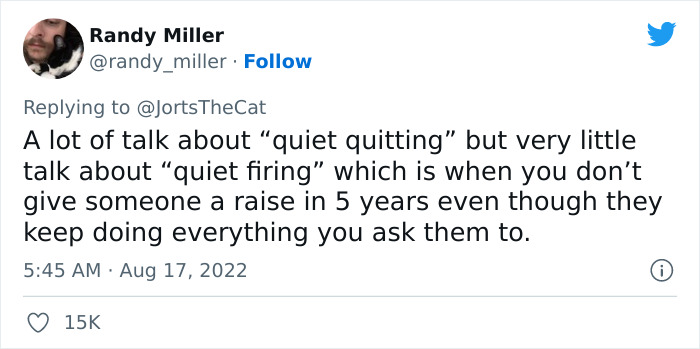
While not as trending or viral as quiet quitting, the mentality of quiet firing is more prevalent among employers and perhaps even more damaging for both organizations and employees. But what is quiet firing? The term refers to when employers take workers for granted, do not acknowledge, appreciate or reward their performance and intentionally treat them poorly, compelling employees to quit, instead of the employer firing them.
Signs of quiet firing may include –
- Lack of respect from employees
- Toxic work culture
- Lack of hikes or raises
- Long working hours
- Expecting extra work without extra compensation
- Minimal sick leaves
- Minimal paid time off
This toxic ‘trend’ has been going on for years and employees have been dealing with this silently, until now – until the emergence of quiet quitting. When an employee feels disrespected by their boss and feels demotivated, their mindset will eventually shift making them detach from their work.
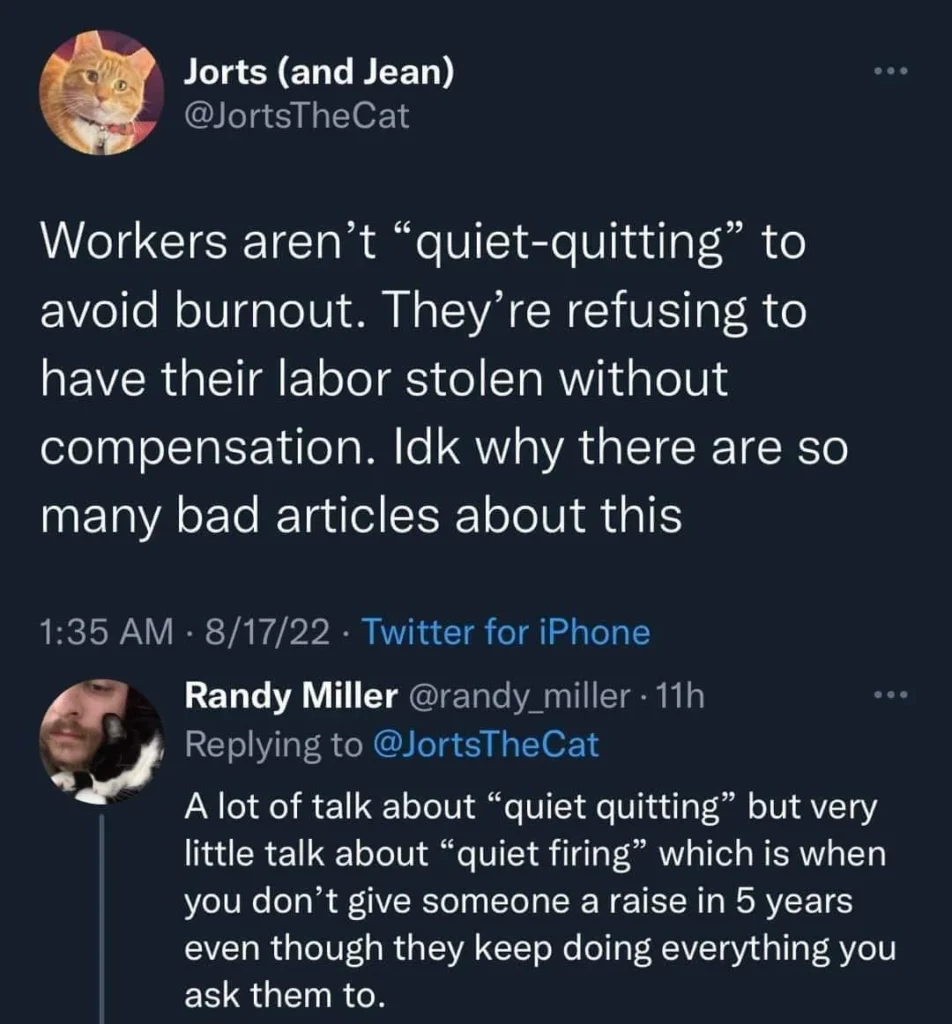
Apart from these, there may be many other reasons why a person may want to quietly quit depending on their personal circumstances, reasons and motivations.
Is quiet quitting good though?
No. While in the short run it may seem like you have better control over your life and have successfully managed to reduce work stress, in the long run the impact of quiet quitting can be severely damaging. In fact, it may be a better idea to actually quit than to quiet quit.
When you are doing the bare minimum at work, you are limiting your opportunities for learning, growth, raises and promotions. If you are not willing to or can’t afford to actually quit your job, and secretly want to be appreciated and rewarded, then quiet quitting can be an excellent strategy for vengeance especially when all your hard work goes unnoticed by your boss. However, this can also mean that your performance will probably get unnoticed in future as well. This can surely spell doom for your career as your growth within the organization will get compromised and restricted. This can be even more of a problem for you if your coworkers are doing more than they are supposed to do. It can also increase your chances of getting fired if your analysis of the ‘minimum required’ work is not on point.
Related: How Long Does Misery In The Aftermath Of Unemployment Last?
Moreover, quiet quitting may also have a negative impact on your future job prospects and your next job as you will not have many accomplishments to boast about. It can also affect you mentally as you slowly lose the motivation and enthusiasm to work, ‘grind’ and ‘hustle’ on a daily basis. This can even encourage your current employer to engage in quiet firing as a retaliation, if they haven’t already.
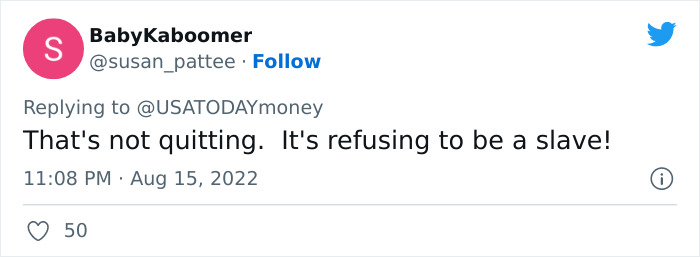
How to prevent quiet quitting
While employees may have good enough reasons for practicing quiet quitting and employers may strongly justify quiet firing, the truth is both of these toxic and passive behaviors are harmful for individuals and companies. Here is how to prevent quiet quitting in the long run and create healthier work cultures –
1. For employees
Before you actually quit quietly, think about and evaluate your situation –
- Why do you want to quietly quit?
- What aspect of your job are you not satisfied with?
- Is your work-life balanced properly?
- Are you getting paid fairly?
- Do you have enough support at work?
- Does your company provide opportunities for growth and development?
- Are there any other problems in your personal life that are affecting your motivation for work?
- Can the issues you are facing at work be solved with company support?
Once you have reflected on your issues, talk openly and honestly with your supervisor, manager or boss. Find out if the company is willing to provide a solution to the problems you are facing and if it is helpful in making the situation better. Then you can decide to engage in quiet quitting. However, it is still a better strategy to actually quit and shift to a new job than emotionally detaching from your existing role, as you will have better control and boundaries in your new job.
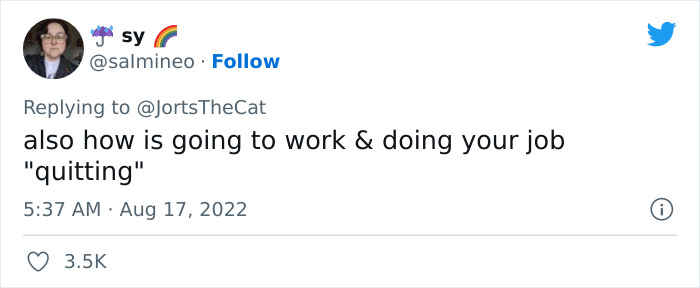
Related: 3 Ways To Like A Job You Loathe
2. For employers
The simplest and most effective way for organizations to deal with quiet quitting is developing a more meaningful, satisfying and inclusive work experience for everyone. Here are a few steps employers can take at the organizational level to prevent quiet quitting –
- Incorporate new policies at the workplace to address burnout
- Improve employee recognition and reward system
- Introduce flexible work shifts and models
- Implement strategies to manage stress in the workplace
- Follow open and transparent communication
- Focus on employee engagement and wellbeing
Such efforts can empower organizations to better motivate employees and eradicate quiet quitting at the workplace.
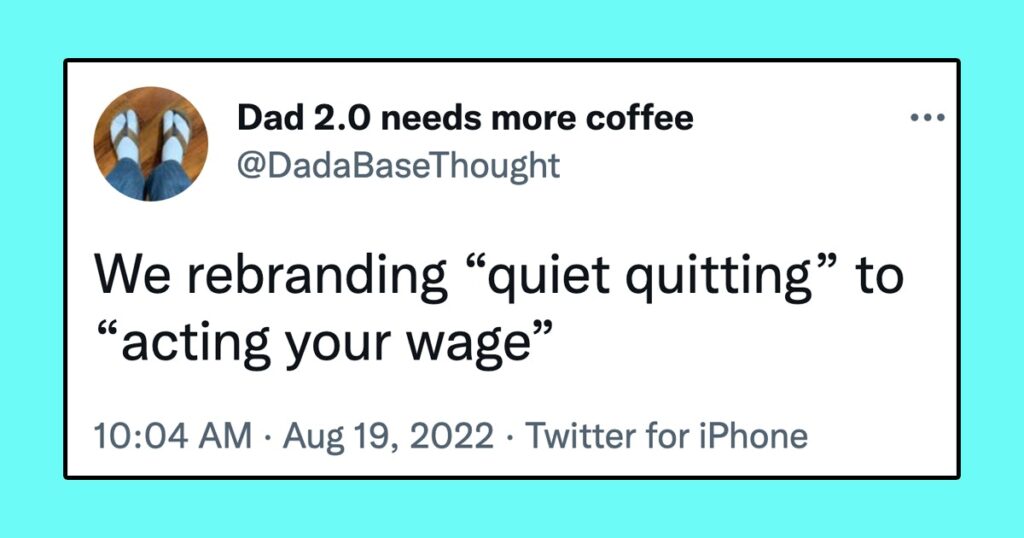
The need for healthier work practices
There are several reasons why someone may be pushed to disengage from their work, detach emotionally and focus on doing the bare minimum at work. This is why companies need to be more mindful about how they treat their employees and put a greater emphasis on employee welfare. While money is a crucial factor, allowing employees to feel proud of their work and making them feel valued and respected is exceptionally important as well.
Although quiet quitting can allow employees to cope with burnout, work-related stress, bring work-life balance and create time to practice self-care and be with their loved ones, in the long run, it can be rather detrimental for their career, motivation and overall well-being.
It is better to quit and find new opportunities, then to engage in such passive, unhelpful behavior, even though it may seem like an excellent idea to you at the moment as an employee.
So take some time off to reflect and develop a clear plan about your future rather than just following viral online trends. Trends will come and go, you are here to stay.
Be smart. Be successful. Be happy.
Related: How to Find the Right Job for You When You Have an Ongoing Mental Health Condition

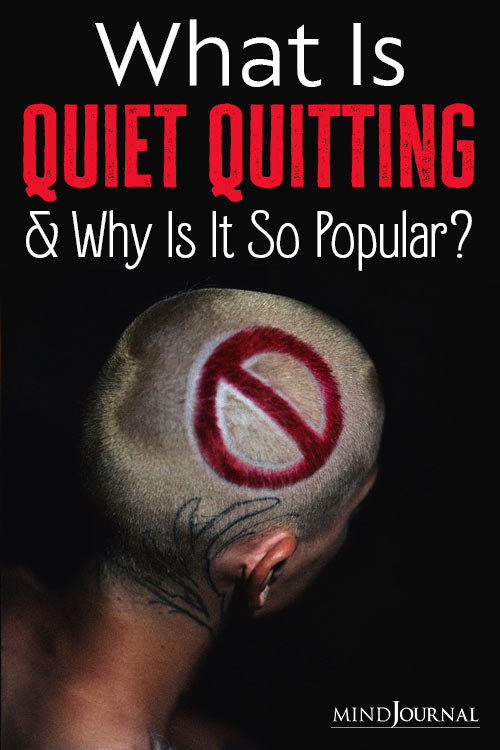
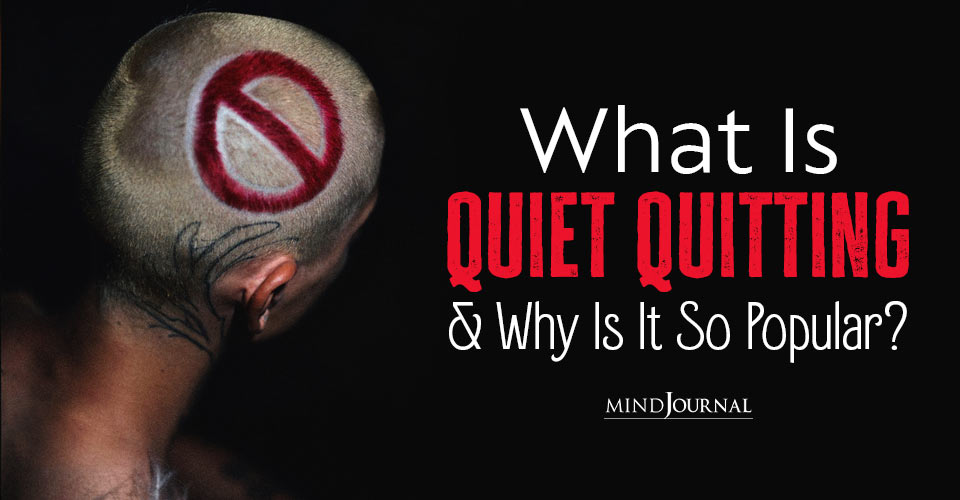







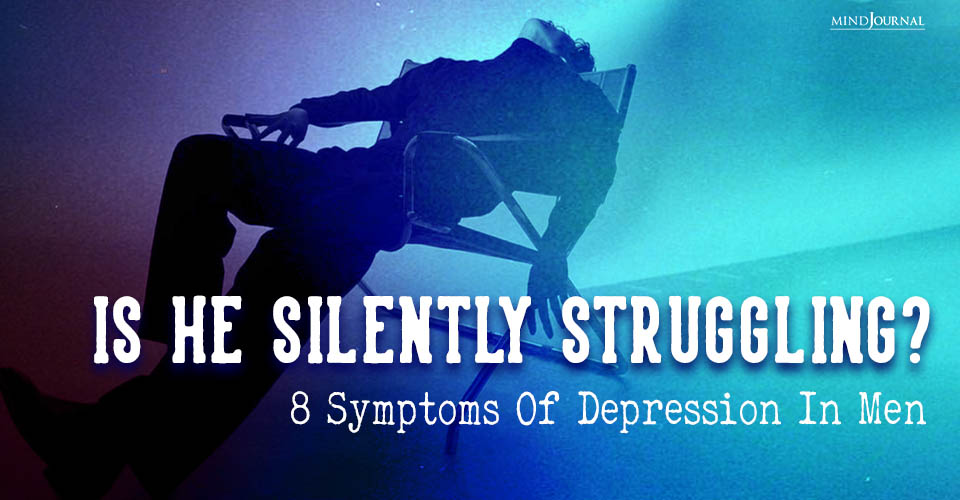




Leave a Reply
You must be logged in to post a comment.